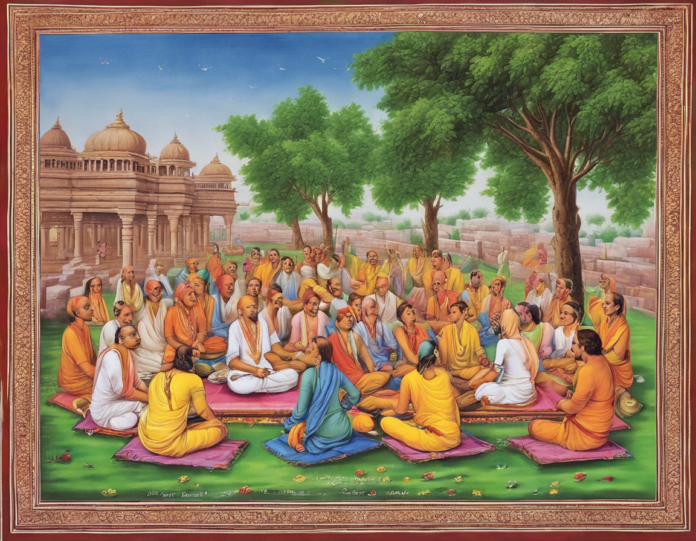In the realm of Indian literature and culture, the name of Tulsidas stands tall as one of the most revered and cherished figures. Born in the 16th century, Tulsidas was a poet-saint, philosopher, and reformer whose contributions continue to resonate across generations. His most renowned work, the epic poem Ramcharitmanas, is considered a cornerstone of Hindu literature and has had a profound impact on the spiritual and cultural landscape of India. In this blog post, we will delve into the life and contributions of Tulsidas, shedding light on his background, works, and enduring legacy.
Early Life and Background
Tulsidas was born in Rajapur, a small village in present-day Uttar Pradesh, India, in the year 1532. His parents, Atmaram Shukla Dube and Hulsi, were devout Brahmins who named him Rambola. Orphaned at a young age, Tulsidas was brought up by his relatives. His uncle, Narharidas, played a significant role in his upbringing and education.
Tulsidas demonstrated a keen intellect and inclination towards spirituality from a young age. He received classical education in Sanskrit and Hindi literature and scriptures. Despite his early exposure to religious teachings, Tulsidas led a worldly life in his youth, working as a poet and musician in the royal court of Emperor Akbar in Fatehpur Sikri.
Spiritual Transformation
The turning point in Tulsidas’s life came when he met the revered saint Hanuman in Ayodhya. Inspired by Hanuman’s devotion to Lord Rama, Tulsidas underwent a spiritual transformation and dedicated himself to the worship of Lord Rama. It is said that he had a vision of Lord Rama, who instructed him to write the story of his life. This divine revelation led to the composition of the epic poem Ramcharitmanas, which remains one of the most cherished religious texts in Hinduism.
Literary Contributions
Tulsidas’s most famous work, the Ramcharitmanas, is a retelling of the ancient Hindu epic Ramayana in Awadhi, a dialect of Hindi. Composed in seven books or kands, the Ramcharitmanas recounts the life and adventures of Lord Rama, showcasing his virtues, ethical values, and divine nature. Tulsidas’s poetic rendition of the Ramayana has made the epic accessible to the masses and has played a vital role in spreading the ideals of dharma and devotion across the Indian subcontinent.
Apart from the Ramcharitmanas, Tulsidas also composed several other works, including the Hanuman Chalisa, a devotional hymn praising Lord Hanuman, and the Vinaypatrika, a collection of devotional prayers and verses. His works are characterized by their simplicity, devotional fervor, and philosophical depth, making them enduring classics of Bhakti literature.
Legacy and Influence
Tulsidas’s legacy extends far beyond the realm of literature. His teachings on dharma, morality, and devotion have inspired countless individuals to lead a righteous and spiritually fulfilling life. The recitation of his works, particularly the Ramcharitmanas and the Hanuman Chalisa, remains a popular ritual in many Hindu households and temples.
In addition to his literary contributions, Tulsidas is also credited with promoting the use of Hindi as a language of devotion and spirituality. By writing in the vernacular and making complex philosophical ideas accessible to the common people, Tulsidas played a crucial role in democratizing religious discourse and fostering cultural unity.
Tulsidas: A Beacon of Spiritual Wisdom
In conclusion, Tulsidas stands as a towering figure in the annals of Indian literature and spirituality. His life exemplifies the transformative power of faith and devotion, and his works continue to guide and inspire seekers on the spiritual path. Through his poetry, Tulsidas shared the timeless teachings of love, compassion, and righteousness, leaving behind a rich legacy that continues to illuminate the hearts of millions.
Frequently Asked Questions (FAQs)
-
Q: When and where was Tulsidas born?
A: Tulsidas was born in 1532 in the village of Rajapur, Uttar Pradesh, India. -
Q: What is Tulsidas’s most famous work?
A: Tulsidas’s most famous work is the epic poem Ramcharitmanas. -
Q: What language did Tulsidas compose his works in?
A: Tulsidas composed his works in the Awadhi dialect of Hindi. -
Q: What inspired Tulsidas to write the Ramcharitmanas?
A: Tulsidas was inspired by a vision of Lord Rama, who instructed him to write the story of his life. -
Q: Apart from the Ramcharitmanas, what are some other works by Tulsidas?
A: Other works by Tulsidas include the Hanuman Chalisa and the Vinay Patrika. -
Q: What is the significance of Tulsidas’s literary contributions?
A: Tulsidas’s works promote the ideals of dharma, devotion, and spiritual wisdom, influencing generations of readers. -
Q: How has Tulsidas’s legacy influenced Indian culture?
A: Tulsidas’s teachings and works have inspired moral and spiritual growth, and his writings continue to be revered in Indian households and temples. -
Q: What role did Tulsidas play in promoting the Hindi language?
A: Tulsidas advocated for the use of Hindi as a language of devotion, making religious texts more accessible to the masses. -
Q: What values are emphasized in Tulsidas’s works?
A: Tulsidas’s works emphasize values such as love, compassion, righteousness, and devotion to God. -
Q: How does Tulsidas’s life exemplify the power of faith and devotion?
A: Tulsidas’s spiritual transformation and dedication to Lord Rama’s worship highlight the transformative power of faith and devotion in one’s life.






